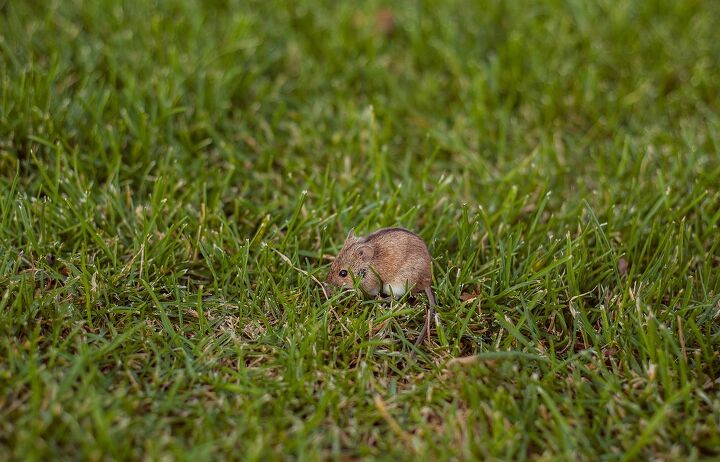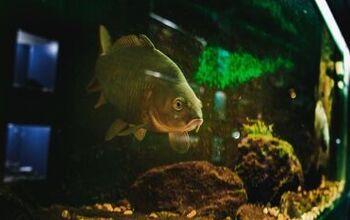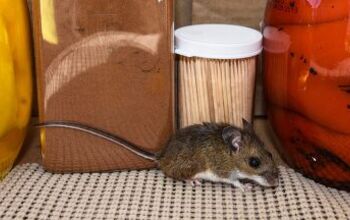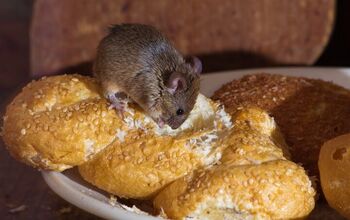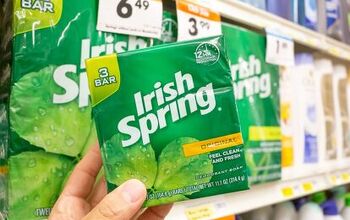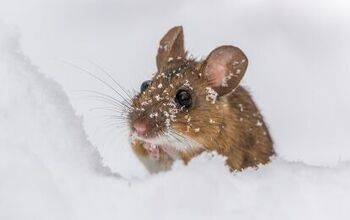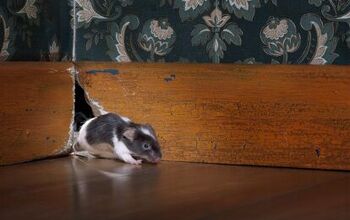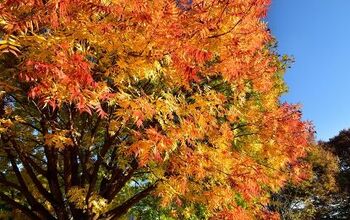Do Mice Eat Grass? (Find Out Now!)

Mice are a common household pet but can also be wild in your house as well as outside. The house mouse is the most commonly encountered and economically significant of all the rodents. It has, for some years now, also become a very popular household pet.
What a mouse eats can vary from seeds to fruit to a variety of vegetables and even grass. Grass has a particular nutritional value for a mouse as well as helping in bedding and nesting. You can employ several techniques t stop mice from eating your grass, including maintenance, chemicals, and using a professional.
House mice breed rapidly and can adapt to their environment quickly. Female mice can give birth every three weeks to half a dozen babies. With so many mice, you can bet they eat a lot of grass and food.
Do You Need Pest Control Services?
Get free, zero-commitment quotes from pro contractors near you.

Things To Know About House Mice
House mice are typically dusty gray with cream-colored bellies, and their fur color is light brown to dark gray. The coat color depends on where they are located and live. House mice have four legs and a round-shaped body.
Their muzzles are pointed, and their ears are large with some hair which helps with hearing and cooling. House mice range from 2.5 to 3.75 inches long, and their tails are usually 2.75 to 4 inches long. Admittedly, they can be cute, but they can also become a big nuisance.
Mice can be a very well-known house pest that gets into your pantry or garage. However, they also love to be cuddled and pet if you raise them as a household pet.
Mice are often nocturnal, which means that they mainly come out at night. Being nocturnal means that you often won’t see them until it is too late. They are also low to the ground, so their specialty is hiding in the grass and small spaces.
Do Mice Eat Grass?
Mice can and will eat grass, especially in the wild. Mice are known to be omnivorous, which means they can eat both meat and vegetables. In nature, mice prefer to eat cereal and seeds, but they also eat insects, nuts, and fruits.
Inside structures, mice will consume almost any human food but prefer grain-based products.
If you own a mouse, you can also feed them grass. They have been known to use the grass for nesting and love Bermuda grass.
Mice are resilient animals that can survive in many conditions. They have a reputation for eating anything and everything in their path, grass included.
Furthermore, mice can even possess some cannibalistic tendencies. They will sometimes turn to eating each other if their food supply is scarce.
Having Mice As Pets
Mice can make excellent pets for most people. They are clean, friendly, and very active creatures who will give you hours of enjoyment. Mice are also quite intelligent, which means they can be taught to do tricks with lots of time and attention.
They will develop strong personalities of their own and can live from anywhere between 1-3 years. You do not have to have any experience in owning a mouse before you get one.
They are very hardy, but due to fragile bones and tiny bodies, children should not own them. Due to their small size, they can get hurt or injured if handled poorly.
They are easily distinguished from wild mice due to their fantastic variety of colors and varying eyes. House mice can be white, black, brown, brindle, spotted, grey, gold, ginger, or even multi-tonal.
Mice As Pests
Mice can be the most troublesome and economically impactful pests in the United States. Outside, mice live and thrive under a variety of conditions in and around homes and farms. They can consume food meant for humans or pets.
Plus, they often contaminate food surfaces with their feces, which can contain the bacteria. This type of bacteria is harmful and can cause food poisoning. Additionally, their gnawing causes damage to structures and can possibly ruin your property.
Mice have a great sense of taste, hearing, smell, and touch. They climb and can run up any rough vertical surface. They will run horizontally along wires and ropes and can jump up 13 inches.
It’s hard to keep mice out once they’ve decided they want to come in. The skull and skeleton of a mouse are pliable, which means they can slide into any crack.
They can slip through a gap that a pencil will fit into. That is a small hole, but a mouse can flatten and change so they can squeeze on through.
How Do You Stop Mice From Eating Grass?
Some tips to keep mice from killing and eating your grass entail maintenance and monitoring. You can do this at any time of year and in any condition. Since mice are known to adapt, you may have to stay on your toes.
Keeping your grass mowed and short will deter mice from eating it and hiding in your lawn. Mice don’t like to be in the open, so they will stay away if it’s too short. If there is no tall grass, there is nowhere to hide and eat.
Do not keep waste piles in your yard, and move woodpiles away from your home. They find these spots to live in, and therefore you will see them eating your grass and trash.
Treating your yard with chemicals and fertilizers can deter mice as well. They will not eat your grass if you fertilize or treat it since the taste is not appealing. However, even though treating for mice can be a deterrent, it can be expensive when it involves a company.
Should Mice Eat Grass?
You might assume that since mice will eat anything, they can eat whatever they want. This concept certainly applies to grass.
Mice can eat grass and will do so if it is readily available. Primarily, mice eat a varied diet of which grass can be a significant feature.
Mice that live outside in the wild are regularly known to eat grass, so your pet mouse can too. Mice are very opportunistic and will eat all sorts of grains and vegetables. For them, it is a matter of survival.
Mice who live indoors, with you as a pet, prefer a high-carb diet and require more food. This involves vegetables, some fruit, and grains, as well as store-bought specialty foods. However, a mouse will never say no to a bit of grass that you give them.
What Health Benefits Does Grass Have For Mice?
Grass and hay can instigate mice’s natural foraging instincts. Eating grass can give them vital nutrients and help in digestion. The grass is beneficial in helping to prevent obesity and a healthy living style.
Grass contains vitamins that can also aid in hydration and enrichment. Grass also helps entertain them and can help make their nest warmer. It is something they enjoy sleeping in when winter comes since mice do not hibernate.
Do You Need Pest Control Services?
Get free, zero-commitment quotes from pro contractors near you.

Related Questions
How do I choose a pet mouse?
When choosing a pet, you always want to pick one that matches your lifestyle. A mouse is a very common pet that is easy and manageable with any type of lifestyle. Mice are active, cute, furry, and fun when you know how to care for one.When picking the perfect mouse, you want to look for an active, smooth, and clean mouse. All of those characteristics are a sign of a healthy and happy mouse. You can be assured if your mouse has bright eyes and pink skin, they are young and healthy.Getting a cage, house, and bedding for your mouse is something that will take your time and research. You want to give your mouse stimulation and care when it comes to getting treats and toys. A mouse can be a fabulous furry friend if you know what you want.
What food can I give my pet mouse?
Mice are omnivores and need a variety of grain, fruit, and veggies. They may even enjoy the occasional bug as wild mice do. Buying store-bought food can give them all the essential nutrients they may need, as well.Products that contain at least 16% protein, 4% fat, and 18% fiber will give you mouse a balanced diet. Having clean water and a clean cage will help them to maintain their optimal health level. Bite-sized pieces of cucumber, broccoli, or peas can give your pet a healthy snack.Any foods from Kaytee to Supreme Pet Foods will provide your mouse with a nutritional, beneficial meal. These companies spend thousands of hours researching, analyzing, and testing products. They do this just to recommend the best picks for most consumers like you.
Do mice like cheese?
As the classic cartoon shows a mouse scrounging for a piece of cheese, is this really what they like? Mice do love to have a bit of cheese, but it is not their favorite. They prefer foods with higher carbohydrates and sweetness. A mouse is more likely to want a piece of chocolate than a piece of your cheese sandwich. However, you won’t see a mouse turn down a piece of cheese either. A wild mouse will not be discriminate against it if it is readily available to them.

Stacy Randall is a wife, mother, and freelance writer from NOLA that has always had a love for DIY projects, home organization, and making spaces beautiful. Together with her husband, she has been spending the last several years lovingly renovating her grandparent's former home, making it their own and learning a lot about life along the way.
More by Stacy Randall



